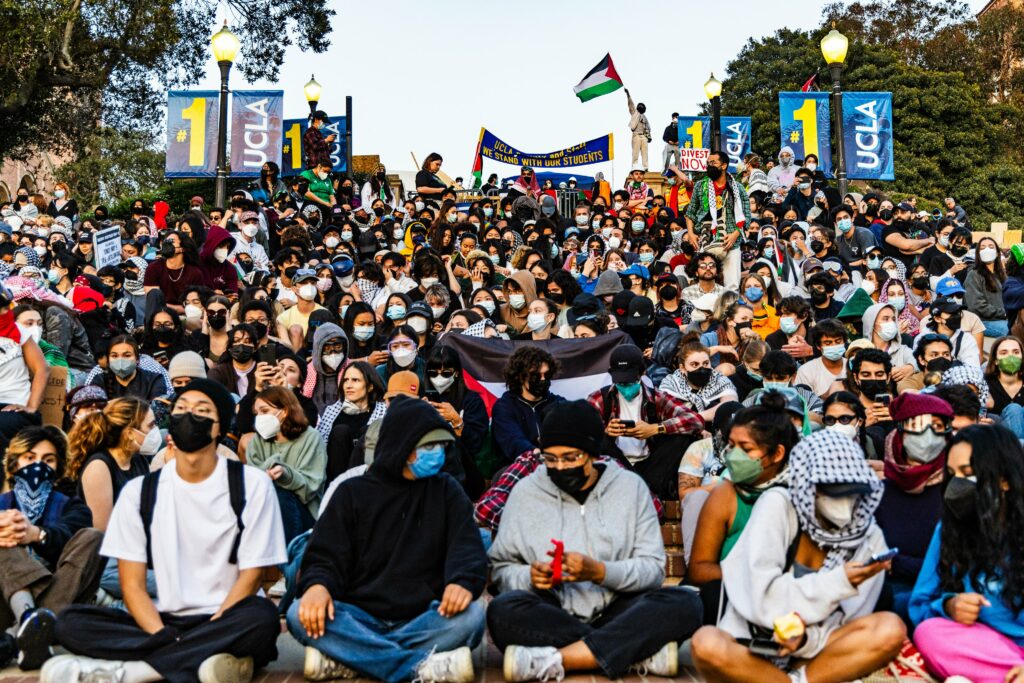
Hundreds of UCLA students protest in support of Palestinians on May 2, 2024.
Credit: Christine Kao
A federal judge issued a preliminary injunction that goes into effect Thursday ordering UCLA to ensure equal access to Jewish students in reaction to the university’s handling of pro-Palestinian encampments last spring.
Three Jewish students in June sued the University of California system, arguing that UCLA allowed protesters to erect an encampment that blocked Jewish students from accessing parts of campus, including classrooms and an undergraduate library.
U.S. District Judge Mark C. Scarsi agreed that UCLA knew students could not enter parts of campus because of their religious beliefs.
“In the year 2024, in the United States of America, in the State of California, in the City of Los Angeles, Jewish students were excluded from portions of the UCLA campus because they refused to denounce their faith,” he wrote.
“UCLA does not dispute this,” Scarsi wrote. “Instead, UCLA claims that it has no responsibility to protect the religious freedom of its Jewish students because the exclusion was engineered by third-party protesters. But under constitutional principles, UCLA may not allow services to some students when UCLA knows that other students are excluded on religious grounds, regardless of who engineered the exclusion.”
The order bars the UC defendants from “knowingly allowing or facilitating the exclusion of Jewish students from ordinarily available portions of UCLA’s programs, activities, and campus areas, whether as a result of a de-escalation strategy or otherwise.” It also gives the campus until Aug. 15 to instruct campus security, police and student affairs “not to aid or participate in any obstruction of access for Jewish students to ordinarily available programs, activities, and campus areas.”
The order was first reported by the Los Angeles Times.
UCLA was one in a wave of campuses where protesters built encampments in solidarity with Palestine as part of a campaign demanding universities sever financial ties with Israel.
The Los Angeles Times and other news outlets have reported on incidents in which Jewish students said they were blocked from entering the encampment. An April 30 video of Jewish students being rebuffed by protesters when they attempted to walk through the camp went viral. Pro-Palestinian organizers have said restricting who could enter the camp was a measure meant to protect protesters from harassment and abuse.
Counter protesters attacked the camp on the evening of April 30, attempting to tear down barricades and hurling objects at the protesters. The university was criticized for not doing more to protect the pro-Palestine students.
The university’s police chief was temporarily reassigned in May pending a review of the school’s security processes. UC President Michael Drake has also requested an investigation into how the campus responded to the violent attack on the pro-Palestinian camp.
Attorneys for the UC system seeking to prevent the injunction argued that the university has already taken steps to ensure its students’ safety and access to education, including by creating a new campus safety office that is “empowered to take decisive action in response to protest.”
Mary Osako, UCLA vice chancellor for strategic communications, said in a written statement that the ruling interferes with how the university can react to events on its campus.
“UCLA is committed to fostering a campus culture where everyone feels welcome and free from intimidation, discrimination, and harassment,” Osako said. “The district court’s ruling would improperly hamstring our ability to respond to events on the ground and to meet the needs of the Bruin community. We’re closely reviewing the Judge’s ruling and considering all our options moving forward.”
The Becket Fund for Religious Liberty and Clement & Murphy PLLC represent the plaintiffs. Becket indicated in a press release about the order that UC defendants are expected to appeal the ruling.
“UCLA is still in charge of its own campus,” Mark Rienzi, president of Becket and an attorney for the students, said in a statement to EdSource. “But the court’s order means that however UCLA decides to manage its campus, allowing the exclusion of Jewish students is not an option on the table.”
The Los Angeles Times reported that UC leaders are working on a systemwide plan regarding how its campuses will respond should protests of the Israel-Hamas war continue in the fall. Drake has until Oct. 1 to issue a report to that effect, according to the Times.





